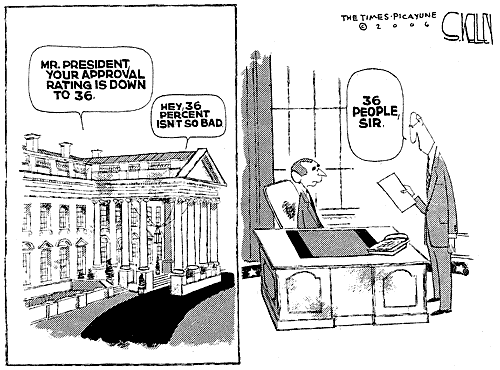Tuesday, November 21, 2006
AP: Approval of Bush policy on Iraq declines

Approval of Bush policy on Iraq declines
By WILL LESTER, Associated Press Writer1 hour, 38 minutes ago
Americans' approval of President Bush's handling of Iraq has dropped to the lowest level ever, increasing the pressure on the commander in chief to find a way out after nearly four years of war.
The latest Associated Press-Ipsos poll found just 31 percent approval for Bush's handling of Iraq, days after voters registered their displeasure at the polls by defeating Republicans and handing control of Congress to the Democrats. The previous low in AP-Ipsos polling was 33 percent in both June and August.
Erosion of support for Bush's Iraq policy was most pronounced among conservatives and Republican men — critical supporters who propelled Bush to the White House and a second term in 2004. A month ago, approval of the president on the issue certain to define his presidency was 36 percent.
"I'm completely frustrated," Rep. Robin Hayes (news, bio, voting record), R-N.C., said this week during a House Armed Services Committee hearing. Hayes' district includes part of Fort Bragg, and he supports the U.S. effort but favors pushing Iraqi troops to take more responsibility for the fighting.
Bush's low numbers underscore the high expectations for the report by the Iraq Study Group headed by former Secretary of State James A. Baker III and one-time Democratic Rep. Lee Hamilton. The demand for an exit strategy comes as the number of U.S. dead from the conflict exceeds 2,850.
Violence in Iraq, much of it between religious sects, continues unabated. Dozens of employees at Iraq's Higher Education Ministry were kidnapped this week and some were reportedly tortured before they were released; bombings and shootings claim Iraqi lives daily.
"Hopefully the Baker-Hamilton commission can offer a face-saving measure for the White House that can put the beginning of the end in sight," said Rep. Ike Skelton (news, bio, voting record), D-Mo., who is in line to become chairman of the House Armed Services Committee.
Two options under discussion — greater cooperation with Iran and Syria, and a phased withdrawal of U.S. troops — would require a major policy shift by the Bush administration
Almost by default, the poll showed Bush approval on handling the economy his strongest issue — at 43 percent, according to the poll of 1,000 adults taken Monday through Wednesday.
The poll, which has a margin of sampling error of plus or minus 3 percentage points, also found:
_34 percent think the country is headed in the right direction; Democrats are more optimistic while Republicans are more pessimistic since the election.
_36 percent approve of the job being done by the president; this is close to the results in early October.
_26 percent approve of the job being done by Congress, also close to approval levels in early October.
The decline in support on Iraq was the most notable change. Anger about Iraq also was a strong theme for voters, according to exit polls taken for The Associated Press and the television networks on Election Day.
A majority of voters disapproved of the war in Iraq, thought the war had not made the United States more secure and wanted to see troops start coming home, those exit polls found.
"The president recognizes that the American people are understandably concerned about the violence in Iraq," said White House spokeswoman Emily Lawrimore. "He shares their concerns but believes that our policy in Iraq must be determined by victory in the war on terror, not public opinion polls."
Some people question whether victory is achievable.
"Now it's a total mess and I don't have the faintest idea how they're going to get out," said Arthur Thurston, a Democratic-leaning independent from Medina, Ohio. "Iraqis are fighting each other now. But the U.S. troops can't just walk out."
Bush has met with Democratic leaders since the election, though Senate leader Harry Reid of Nevada says he thinks the president will need to be pushed to change his stance on Iraq.
"I agree that we need to stay over there and finish what we started. I don't like that our people are over there dying. But if we don't finish it, it will come back over here," said Kelly Mangel, an independent from Sedalia, Mo.
The public divisions over the war have left the Iraq Study Group with a difficult job.
"If there's any hope," said a Democratic member of the blue-ribbon panel, Leon Panetta, "it's that our recommendations can help pull the country together — if Republicans and Democrats can agree on a common strategy."
Panetta said the group hopes to offer recommendations in December but "that will depend on when we reach consensus."
"We've certainly covered a great deal of territory," he said. "And now we're getting down to the hard work of looking at options."
___
AP's Manager of News Surveys Trevor Tompson, AP News Survey Specialist Dennis Junius and AP writer Anne Plummer Flaherty contributed to this story.
___
On the Net: